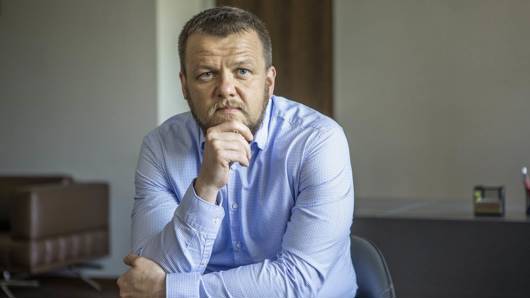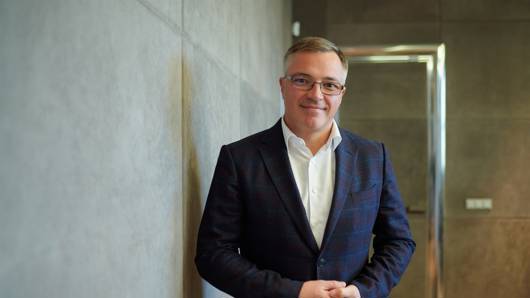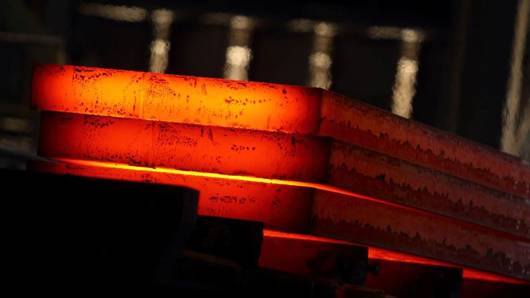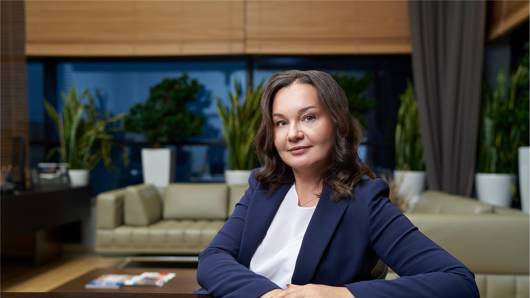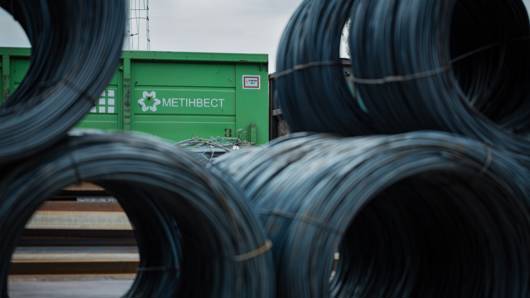The leading Spanish media outlet El Pais are the first journalists allowed to see Metinvest's workshop that makes mine rollers for the Ukrainian armed forces. In a large article, the journalists described how Ukraine is bolstering its defence industry. This is a translated and adapted version of the article.
In one of Ukrainian cities, a van arrives to pick up a journalist in a parking lot. The vehicle’s windows have been blacked out with dark fabric, so that passengers can't see where it's going. Cell phones must also be turned off. The van then makes several detours, before reaching its destination: a production site belonging to Metinvest, Ukraine’s largest business group. There, in one of workshops, mine rollers for tanks are being built — a tool that is key to breaking through Russian defensive lines. For the Ukrainian army, this is a crucial piece of technology; one of many examples of the efforts being taken by Ukraine's private sector to bolster the domestic defence industry and move away from dependence on international aid.
Metinvest’s majority shareholder is Rinat Akhmetov. He is best known across Europe as the owner of Shakhtar (Donetsk), a football club that is a regular participant in the Champions League. He is Ukraine’s richest person. Akhmetov hails from Donetsk, the most important city in the Donbas, a region illegally annexed by Russia. Metinvest is a metallurgical giant that bore a heavy brunt during the war. The company lost Azovstal iron and steel works, the largest in the country, located in the enemy-occupied Mariupol. Europe's largest coke-making plant, Avdiivka Coke, is besieged by the Russian troops and idling.
Along with his industrial conglomerate and his football club, Rinat Akhmetov left Donetsk when pro-Russian separatists took control of the city in 2014. Unlike other Donbas businessmen who made their fortunes in the 1990s, he remained faithful to Ukraine. He remained unwavering in his resolve to defend Ukraine and, for the first time, Metinvest became involved in building up the defence industry. This was done at a time when Zelenskyy had called the development of the national defence industry a matter of life and death.
"If we don’t help, nobody will," says Ihor, a spokesperson for Metinvest's mine roller project. The company produces an average of five or six mine rollers a month.
Metinvest’s mine rollers went into service last summer when the counter-offensive in the Zaporizhzhia sector was in full swing. In this area of the front line and in the Donetsk region, the Russian positions are protected by the densest minefields that military analysts can recall witnessing in any war. Speaking to EL PAÍS in September last year, members of the Tor special forces group estimated that there may be as many as five anti-personnel or anti-tank mines per square metre.
Andrii is a colonel in command of a National Guard brigade that is using Metinvest’s mine rollers as it fights in eastern Ukraine. They have been adapted from a Soviet design and improved so that they can detonate up to eight mines, compared to the five that Soviet mine rollers could destroy. Andrii adds that such a mine roller is the first in Ukraine that can be fitted onto any tank model.
Secret underground base
A meeting Andrii, a serviceman of the Ukrainian armed forces, takes place in a secret underground base. For security reasons, the newspaper is asked not to divulge its location. The journalist was also not allowed to see how the rollers work. The longer the war lasts, the greater the secrecy and restrictions on the disclosure of information imposed by Ukraine’s armed forces. When it comes to the domestic manufacturing of defence products, the secrecy is even more pronounced. The commander confirms that Metinvest also provides them with bullet-proof vests, helmets, and portable bunkers.
"I don't know how long the war will last," Andrii says, "but we have a 1,300-kilometre border with Russia. We will always be at risk, and we need our own manufacturing of defence products." The signals coming from Ukraine’s NATO allies suggest that aid is becoming harder to count on. In both the United States Congress and Senate, the Republican Party is blocking $61 billion package (€55.056 billion) that the White House wants to allocate to Ukraine in 2024. And in the EU, €50 billion in aid is being blocked by the Hungarian government, which is close to Moscow. Military aid expenditure reached a record low between summer and autumn, having dropped by 90 percent drop compared to 2022, according to the latest report released by the Kiel Institute for the World Economy.
Against this backdrop, President Zelenskyy's priority task is to boost the country's domestic defence industry and attract major western manufacturers of defence products to open manufacturing bases in Ukraine. In September last year, the president invited 250 representatives of defence companies to a conference in Kyiv to announce a plan to make Ukraine the largest manufacturer of defence products in the West. Nearly 40 of these companies promised to look into investing in production facilities in Ukraine.
However, according to the Ministry of Defence, the rate of production is limited. Any industrial infrastructure, particularly if it is producing strategic defence materials for Ukraine, may find itself in Russia’s crosshairs. The best form of protection is a good air defence system. However, the closer to the Russian positions, the less time for an anti-aircraft battery to react, especially when it comes to ballistic and cruise missiles. Even if you are far away from the enemy, the danger is still there.
On 4 December, the Carnegie Endowment for International Peace, a U.S. politics and defence think tank, published a pessimistic report on the potential of Ukraine's defence industry. The author of the report is Kateryna Bondar, a former adviser to the Ukrainian Ministry of Defence and Ministry of Finance. She draws gloomy conclusions on all fronts, beginning with the country’s security. "There is no silver bullet for mitigating the risk. Relocating production underground, for example, would raise costs significantly and worsen working conditions. Air defence systems are in short supply and cannot ensure total protection," she says.
In Bondar's view, the efforts undertaken by companies such as Metinvest and thousands of small private initiatives will take time to provide solutions. "Major investment in new physical infrastructure remains unlikely as long as the threat of Russian attacks exists," she says.
By Cristian Segura






